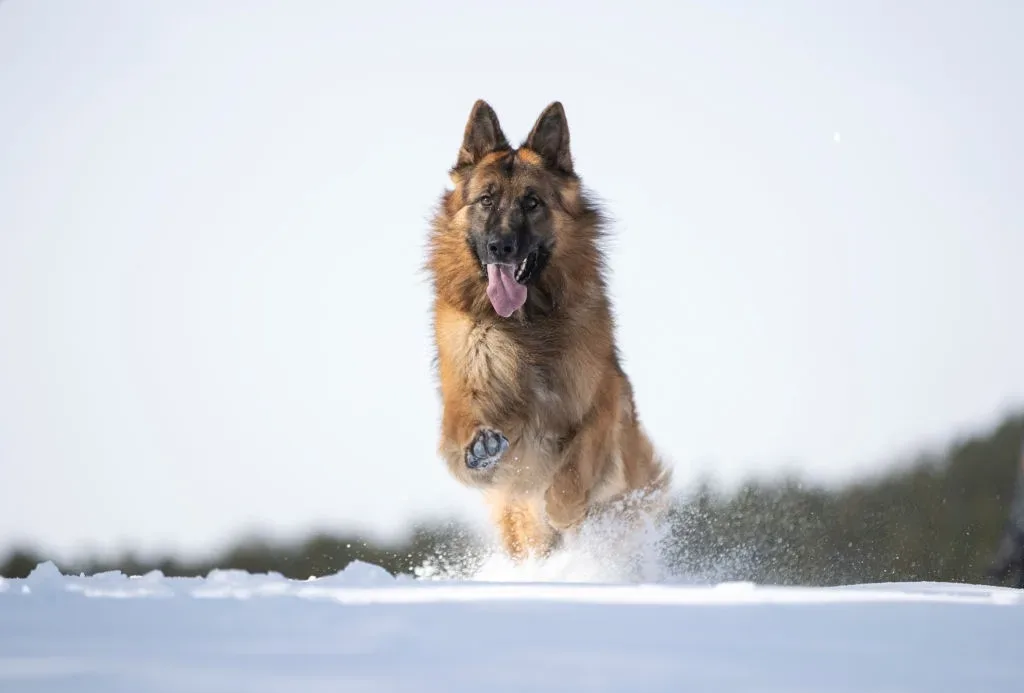For the Question, Are German Shepherds friendly? or Are German Shepherds Good with other Dogs? The answer is YES, They are!
Table of Contents
For the question Are German Shepherds Friendly? We say German shepherd dogs are very friendly and can be aggressive with other dogs or pets at the same time. This depends on various reasons.
They can be aggressive towards same gender dogs but most German shepherds are good with other dogs and pets. His aggressive behavior can be a result of poor socialization and improper training. Some owners willfully train their German shepherd dogs to be aggressive.
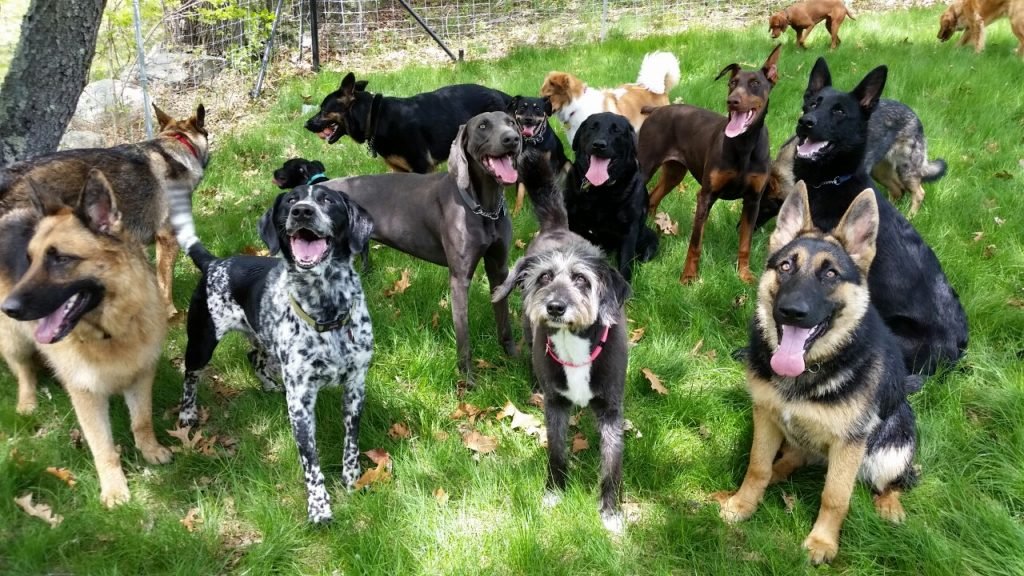
A German shepherd who doesn’t like anyone can be a big problem. If you walk in a park with your German shepherd dog and if he is shouting at everyone, you will surely need a friendly person to talk to.
Let’s discuss a few points about the behavior of German shepherds:
Firstly:
HOW AGGRESSIVE IS A GERMAN SHEPHERD TOWARDS OTHER DOGS?
Every dog has its own identity and temperament. For example, if a German shepherd dog is aggressive towards other pets, it may be because its owner does not pay enough attention to its training and socialization that is something like introducing him to other dogs, visiting dog parks in the evenings.
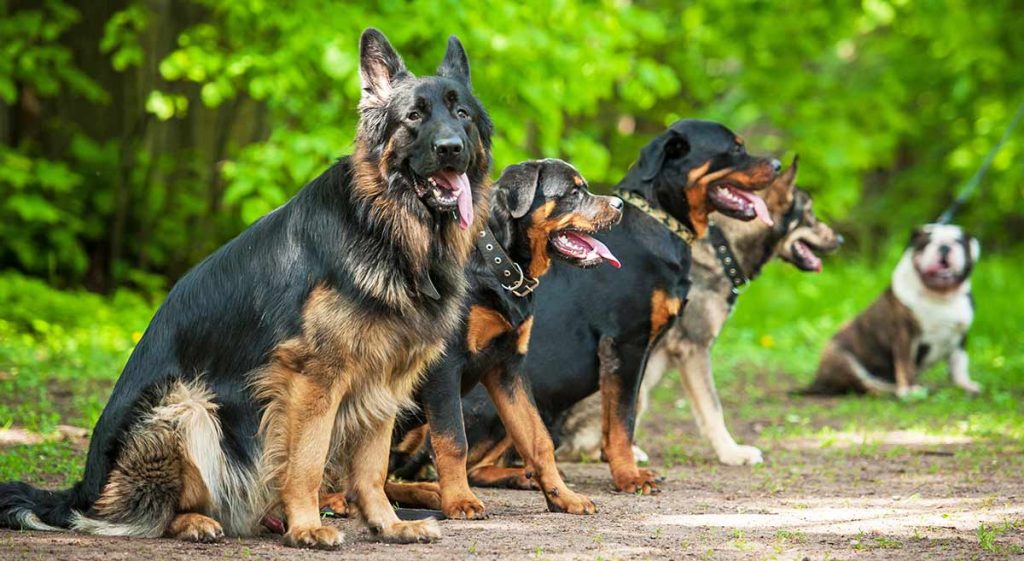
If you socialize your German shepherd dog with other pets and humans from the beginning you will never face any problem with German shepherds.
How can I encourage my German Shepherd to be more sociable with other dogs?
German Shepherds are known for their intelligence and loyalty, but how do you ensure they’re friendly and comfortable around other dogs? Just like people, dogs need proper socialization to foster positive interactions. Let’s delve into some effective ways to make your German Shepherd more amiable with their canine companions.
Tips for Making Your German Shepherd Friendly with Other Dogs:
- Early Socialization: Introduce your German Shepherd to various dogs during their puppy stage, between 3 to 14 weeks old. This is a critical period when they’re most receptive to new experiences. Positive interactions during this time can lay the foundation for future friendly behavior.
- Positive Experiences: Create positive associations with other dogs by engaging in fun activities like walks, playdates, or even short training sessions together. Reward your German Shepherd with treats or praise for calm and friendly behavior during these interactions.
- Controlled Introductions: Start with controlled, one-on-one introductions in a neutral environment. Keep both dogs on leashes and let them sniff and observe each other without pressure. Gradually increase the time they spend together while monitoring their reactions.
- Body Language Awareness: Learn to read your German Shepherd’s body language. Signs of a relaxed and friendly dog include wagging tails, loose body posture, and play bows. If either dog shows signs of tension (stiff posture, raised fur, growling), separate them and try again later.
- Ongoing Socialization: Regularly expose your German Shepherd to different dogs, environments, and situations. This helps them become more adaptable and less likely to react negatively when encountering new dogs.
Real-Time Example: Imagine you have a German Shepherd named Max. To make him more friendly with other dogs, you’ve been taking him to a local dog park since he was a puppy. During these visits, Max gets to play with various dogs, both small and large breeds. He interacts positively by wagging his tail, engaging in play, and showing no signs of aggression. Over time, Max becomes known as the friendly and sociable pup at the park, enjoying the company of his fellow canine pals.
| Age | Activity |
|---|---|
| 8 weeks | Puppy joins your home. |
| 10 weeks | Begin short walks and exposure to different sounds. |
| 12 weeks | Start controlled playdates with gentle, vaccinated dogs. |
| 16 weeks | Enroll puppy in puppy training classes for structured socialization. |
| 6 months | Regular visits to a local dog park begin. |
| 1 year | Puppy confidently engages with various dogs in the park. |
Remember, patience and consistency are key when helping your German Shepherd become more friendly with other dogs. With time and effort, your furry friend can build lasting and positive relationships with their fellow canines.
ARE GERMAN SHEPHERDS FRIENDLY AND GOOD WITH SMALL DOGS?
In case if you have a German shepherd puppy, you know that you should introduce him to a well-trained dog that is friendly and fully vaccinated.
Introduce him to the other pets in the same place.
Dogs can be aggressive if someone enters their place.
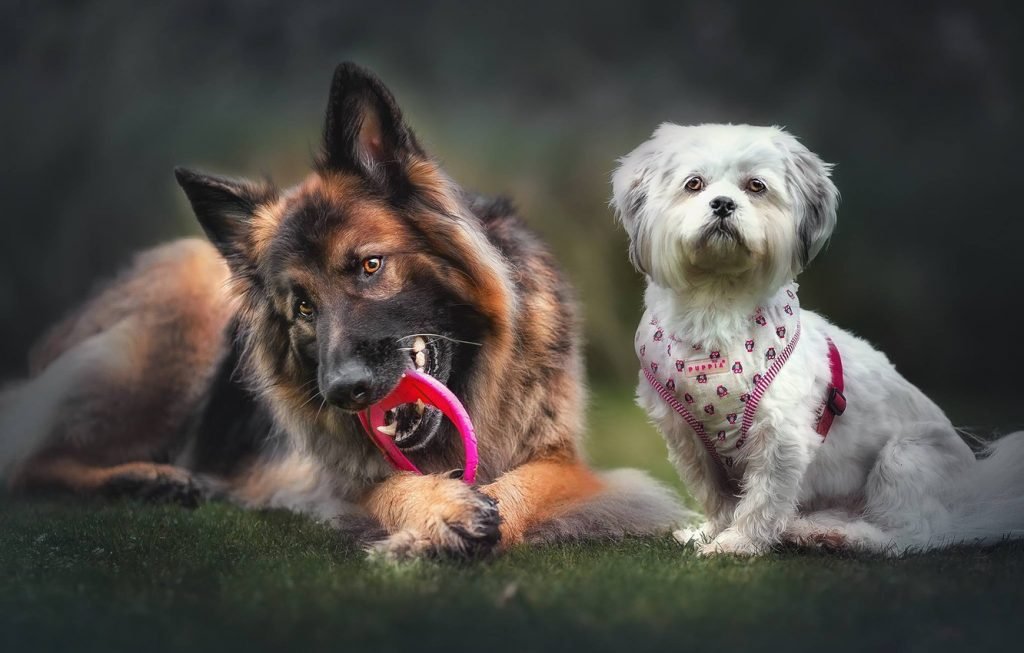
Start by introducing your puppy or dog to a trained and friendly dog. Observe whether other adult dogs are showing signs of aggression or trying to control your puppy.
If you are introducing your German shepherd puppy to new puppies and he is becoming aggressive towards them, give him some time to calm down and then take him to them again. if he continues to behave the same, firmly say ‘NO’.
In such situations, you should take time with your shepherd teach him to get along well with other dogs.
Teaching your big German shepherd dog to respect the small dog’s space, and vice versa, is very important.
WHAT IF I GET AN ADULT GERMAN SHEPHERD?
If you accept an adult German Shepherd, the breeder will be able to give you more information about his behavior. If you bought a very aggressive German Shepherd, try to give him a chance instead.
According to an expert, German Shepherd behavior can be corrected if you take the right steps.
Next, if you adopt a pleasant German shepherd dog who likes to play and socialize with other dogs and pets, that’s cool! You should give your German Shepherd dog plenty of chances to meet and play with other dogs.
Take your dog to a Dog Park and let him enjoy it. Aggressive dogs should not be allowed in dog parks but there are always some people who do not respect the rules so it is better to be careful.
Do German shepherds prefer to be with other dogs?
The German Shepherd is a very dominant kind of dog. They may try to influence other dogs.
What if you already have a dog at home and you want to bring a German Shepherd to stay with him?
German Shepherd dogs love to stay in a company all day. If you have a dog that can play with it is good but it is very important to be a little careful before you introduce a new dog. There are several things you can do to reduce the tension between two dogs and keep them safe.
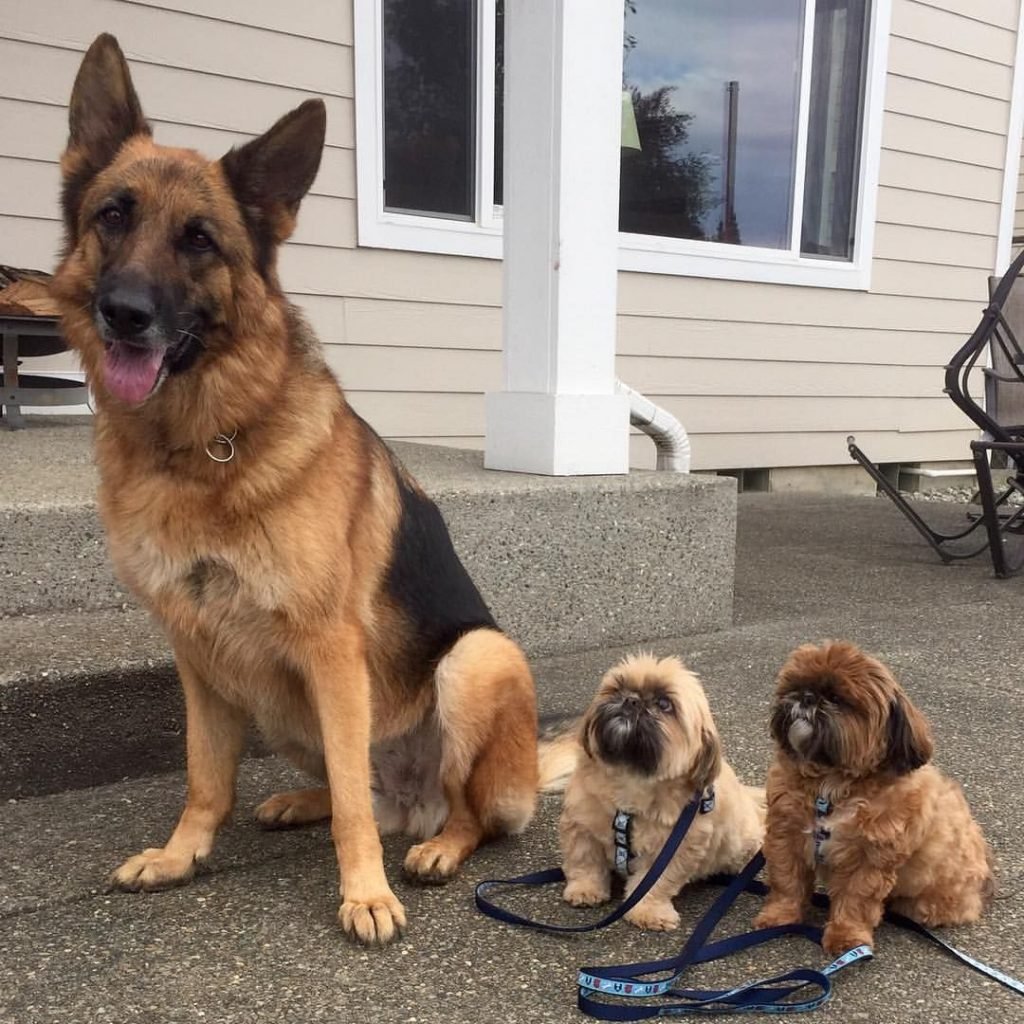
If you already have a dog and you bring a German shepherd puppy home you should consider:
The best pairing you can do is between two different sex types of dogs.
- It is always better to have two different sex types of dogs. For example, if you have a female dog at home, it’s a good idea to bring a male German shepherd.
- If you are bringing home is a puppy. You should keep the older dog away from the new one till the new one gets familiar with the new home environment. The adult dog finds it easy to adopt the puppy if it is already present at home.
- It is important to watch your dogs in the beginning. Don’t let them stay together in your absence.
Don’t let your old dog dominate the puppy. If the big dog tries to bite the puppy, firmly say NO and move him to a different place. Till the dogs get acquainted, their things should not be mixed.
House Guests or Visitors with dogs
Another tool you can use to help keep your dog calm around visitors who visit along with dogs is putting them on leash. This is especially useful for dogs that have not learned the commands.
Prevent your dog from jumping around the house, jumping on guests, and their pets, until their initial excitement is over.
Most dogs will eventually find that when they are calm, the leash will fall off and the puppy will feel better.
This allows you to keep the dog close to you and your visitors so they can have fun and visit, they will be socialized and at the same time learn good doggy ethics with other guests and their dogs.
Be prepared to monitor your pet, especially children, food, breaks and other pets. Yes, your pet is a model of good behavior at home, but the new guest along with a dog visits you, that can cause some nervous behavior.
Even if he hasn’t jumped over the counter since his puppy days or been bullied inside the house, he can do so in a strange house. Be prepared to have your dog on your side or in your sight at all times.
Also Read: 7 Reasons to have a fluffy bed for dogs
Doggy play dates are good, but if your guest dog is not potty trained and relieve at home, it can cause your dog to behave badly. Another dog ‘accident’ inside your home is not an inconvenience to you; it is a sign of spatial marking for your dog.
If your dog smells another dog’s urine, he wants to cover it with his own scent automatically.
Also Read: What neutralizes dog urine smell on concrete? Home Made Odor Removing Technique.
If your dog does not want to urinate inside your home, make it clear that untrained puppies should stay outside or in their own home.
Identify your dog’s territory if he’s only going to do what nature intended and he feels ‘occupied’ by another dog, so save yourself a lot of trouble and limit your visits dogs to outdoor places.
Are German shepherds good with cats?
German Shepherds are large, powerful, strong, intelligent and often dominant and food-driven dogs. That means they are more likely to chase children in their home, yard or neighborhood. Due to their size, the German shepherd, which is aggressive to cats, poses a serious risk to the cat.
The German shepherds were wise enough to know how to trust and whom to follow. But if you neglect to give them the training they need, they can quickly lose control and hit anything that moves on their edge.
Even if your German shepherd only wants to play, a 90-pound Shepard riding on a 10-pound cat can inadvertently injure or kill a cat, for these reasons, you may want to teach your German shepherd not to chase cats. But the hard fact is that cats do not cooperate when your dog wants to be friend!
FAQs
Can a German Shepherd protect you from other dogs?
Absolutely! German Shepherds have a natural protective instinct. They can step in to keep you safe if they sense a threat from other dogs.
Are German Shepherds OK with strangers?
It depends on the dog’s training and socialization. Some German Shepherds might be wary of strangers, while others can be quite friendly once they get to know them.
Do German Shepherds pick one human?
Yes, many German Shepherds become very attached to one person in their family. They’ll show tons of loyalty and love to that special human.
Can German Shepherds sense danger?
Absolutely! German Shepherds are like furry superheroes – they can often sense danger or unusual things happening around them. Their keen senses make them great at this!
What happens if a German Shepherd bites?
A German Shepherd bite can be serious, as they’re strong dogs. It’s important to train them well and treat them kindly to prevent such situations.
What are German Shepherds’ weaknesses?
Despite being awesome dogs, German Shepherds can sometimes be a bit sensitive and might not like being left alone for long periods. They thrive on companionship.
What to do if a German Shepherd attacks you?
Stay calm and try not to run or scream. Avoid direct eye contact, slowly back away, and give the dog space to calm down. Protect your hands and arms, and seek help if needed. It’s important not to provoke them further.
Wrapping up
To sum it up, for the question, Are German Shepherds Friendly? Yes, German Shepherds are friendly and pretty amazing dogs. They’re great at protecting us from danger and becoming best buddies with one person in the family. They can even sense when something’s not right around them, like superheroes!
But, just like any friend, they need to learn how to get along with other dogs and people. Training them when they’re young helps a lot. And even though they’re strong, they can feel sad if they’re left alone too much.
Remember, German Shepherds have strengths, like being loyal and protective, but also things that can be a bit tricky, like feeling nervous sometimes. So, if we take care of them with love and teach them what’s right, we’ll have an incredible friend by our side who’ll make life all the more special.

